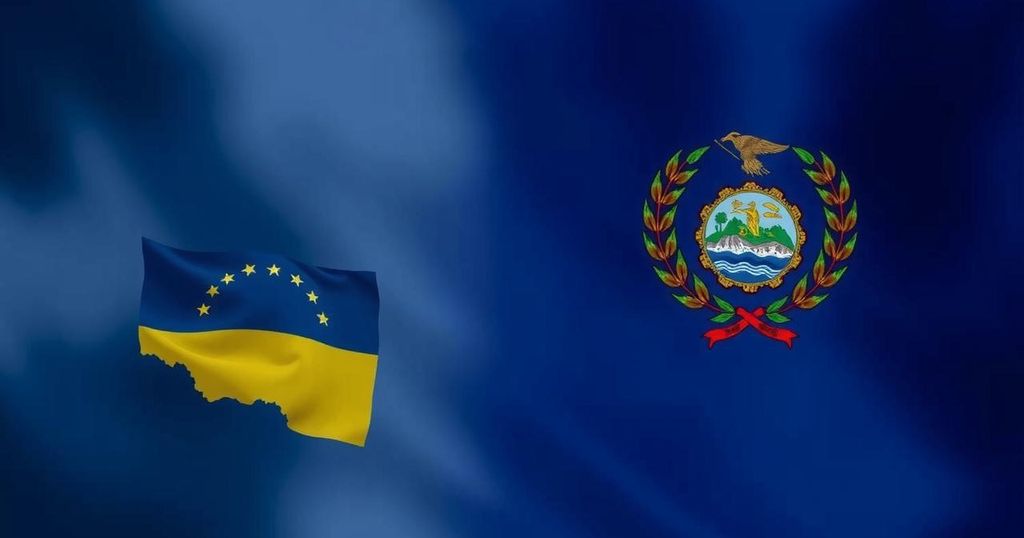Ortega Offers Military Support to Maduro Amid Venezuelan Election Controversy

Nicaragua’s President Daniel Ortega has offered to send “Sandinista fighters” to assist Venezuelan President Nicolás Maduro against potential armed opposition following Maduro’s disputed election victory. Protests in Venezuela have escalated, resulting in violence and many detentions. Ortega criticized regional leaders for not recognizing Maduro’s electoral claim, while the legitimacy of the election remains contested amid allegations of fraud.
Nicaragua’s President Daniel Ortega has extended an offer to supply “Sandinista fighters” to Venezuelan leader Nicolas Maduro in the event of an “armed counterrevolution” following the controversial presidential election held in July. Maduro’s victory has faced skepticism both domestically and internationally, leading to widespread protests and violent unrest that has reportedly resulted in the deaths of at least 24 civilians and one soldier, with thousands detained by security forces. During a recent virtual summit attended by various Latin American heads of state, President Ortega expressed solidarity with Maduro, intimating that if conflict arises, the Nicaraguan government would dispatch Sandinista fighters to support them. The term “Sandinista” is associated with the left-wing faction led by Ortega, who has been in power since the 1980s and is infamous for accusations of electoral fraud. Ortega did not clarify whether the support would consist of military personnel, police units, or armed paramilitary groups, amidst allegations of human rights abuses in Nicaragua. Ortega’s remarks also included criticism of other regional leaders, notably Brazil’s Luiz Inácio Lula da Silva and Colombia’s Gustavo Petro, both of whom have refrained from acknowledging Maduro’s stated electoral victory. He branded Lula’s hesitance as “shameful” and accused him of subservience to US interests. In response, Petro articulated his commitment to human rights in a pointed retort on social media, emphasizing the contrast between their governance philosophies. The legitimacy of Maduro’s presidential election is under scrutiny, with official results indicating a narrow win exceeding 50%. However, external observers, including the United Nations and the Carter Center, dispute these claims, calling for detailed electoral data to ensure transparency. Conversely, the Venezuelan opposition has released evidence suggesting that their candidate may have actually secured victory, contributing to the ongoing political tumult in the nation. In conclusion, the situation in Venezuela remains precarious with Ortega’s offer of military backing serving as a reflection of deteriorating relations within Latin America. The allegations of electoral misconduct continue to fuel protests and discontent, posing significant challenges to Maduro’s regime and raising questions about the future stability of the region.
The political environment in Venezuela has grown increasingly tense following the controversial presidential elections that resulted in Maduro’s claim of victory. International observers and local opposition have raised serious doubts regarding the legitimacy of the electoral process, leading to unrest characterized by protests and violence. In Nicaragua, President Ortega, a long-time ally of Maduro, has also faced scrutiny for his administration’s tactics and allegations of undermining democracy, further complicating regional dynamics among leftist leaders in Latin America who are grappling with similar issues of governance and legitimacy.
Ultimately, Nicaragua’s proposition to send Sandinista fighters to Venezuela underscores the alignment of Ortega with Maduro amid widespread criticism of the electoral process in Venezuela. The ongoing unrest and accusations of electoral fraud signify deeper issues within both nations’ political landscapes, highlighting challenges in governance and human rights. The reverberations of this political discord may have lasting implications for stability in the region as leaders navigate alliances and opposition amid internal and external pressures.
Original Source: edition.cnn.com








